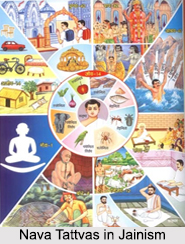 Nav Tattvas in Jainism provides knowledge on those things which obstruct and facilitate ones journey to the path of liberation – a state of supreme happiness. According to Digambara tradition, there are 7 Tattvas and as they include Punya and Papa in Asrava. "Punya and Papa" are types of Karmas and remaining Tattvas explains relation between soul and Karma.
Nav Tattvas in Jainism provides knowledge on those things which obstruct and facilitate ones journey to the path of liberation – a state of supreme happiness. According to Digambara tradition, there are 7 Tattvas and as they include Punya and Papa in Asrava. "Punya and Papa" are types of Karmas and remaining Tattvas explains relation between soul and Karma.
By and large, attainment of happiness and avoidance of misery can be said to be the main goal of every living beings. The aim is to shed all karma and not bind new ones in order to break free and be liberated. Anything that happens in one"s life can be explained through Nav Tattva. According to Jain philosophy, one knows many things if he knows Nav Tattva, and one does not know anything if he does not know Nav Tattva.
Etymology of Nav Tattva in Jainism
"Tat" means "that" or "Real" and "Tva" means "Essence or "Nature". It is essential to know the real nature of things so that one may adopt the right path to achieve one"s goal.
Nav Tattvas in Jainism
The Nav Tattvas are as follows:
1. Jiva (Soul or Self): According to Jainism, there are infinite Jivas or souls. Jivas have the natural rapacity of going in the upward direction. Hence, in the liberated state when there are no binding factors, the pure soul rests in peace on top of the universe (Siddha Kshetra). The Jiva resides in the body in the state of transmigration. The Jiva is pure and devoid of bondage at all times.
2. Ajiva (Matter): That which does not has the capacity to know is called Ajiva. Due to ignorance the Jiva identifies itself with the material body. This wrong identification and consequent activities of mind, body and speech are the main causes of bondage of material Karmas by the Jiva. Karma is Ajiva. It is Jiva which invites Karma. Ajiva is necessary for the Jiva to move.
3. Punya (Meritorious Karma): Auspicious activities of the soul lead to the accumulation of meritorious Karmas. On completion of meritorious Karma it leads to favourable conditions and pleasant experiences for spiritual development. In Jainism, a person has to earn "Punya" in the beginning and leave "Papa" for final purification of soul. Activities such as offering food, drink, shelter, purifying thought, physical and mental happiness, etc. result in producing Punya.
4. Papa (Demeritorious Karma): Involvement in inauspicious activities lead to the bondage of inauspicious Karma. Completion of inauspicious Karma leads to unpleasant circumstances and experiences. Hence, involvement in activities leading to the accumulation of inauspicious Karmas are to be avoided by all means. Activities such as violence, untruth, theft, unchastely, attachment to objects, anger, conceit, deceit, lust, etc. result in producing Papa.
5. Asrava (Influx of Karma): Inflow of Auspicious or Inauspicious Karma Particles into the soul is called "Asrava". Asrava may be described as attraction in the soul toward sense objects. There are 5 main causes that lead to intrusion of karma particles into the soul. The five great sins are violence, untruth, stealing, sensual indulgence, and attachment to worldly objects. These are further sub-divided into 42 types.
6. Samvara (Stoppage of Karma): Samvara is the exactly opposite of Asrava. It means stoppage of inflow of Karma. Non-involvement in activities leading to Asrava is Samvara. It can be accomplished by constant practice of restraint of mind, body and speech, religious meditation, conquest of desire, forgiveness, tenderness, purity, truth, austerity, renunciation, and chastity.
7. Nirjara (Shedding of Karma): It is the practice of shedding of Karmas both auspicious and inauspicious. Nirjara is to be done by rigorous austerities. Nirjara is possible in 2 fundamental ways i.e. Akama Nirjara and Sakama Nirjara.
Akama Nirjara happens in the normal course of nature. It does not require any spiritual endeavor. Sakama Nirjara is a result of spiritual endeavor in the form of practice of Tapa (Penance). In this form of Nirjara, the soul is able to shed off Karma by bringing them to fruition prematurely through spiritual practice of penance.
8. Bandha (Bondage of Karmas): Bandha means binding of Jiva and Karma. It could be both Shubh and Ashubh. Asrava is the cause of Bandha. When Karma gets bound to the soul, certain characteristics regarding these Karma particles entering into the soul are determined.
9. Moksha (Salvation): When the soul liberates itself from the bondage of all the 8 types of Karmas, it attains salvation or liberation. The liberated soul reaches the topmost part of the universe (Siddha Kshetra) and rests in pure state of absolute detachment. The Siddhas, as such souls are called, posses infinite knowledge, infinite bliss and infinite spiritual power.
Thus, the knowledge of Nav Tattvas helps one to understand concept of relationship of Karma with Jiva and the ultimate understanding of liberation.




















